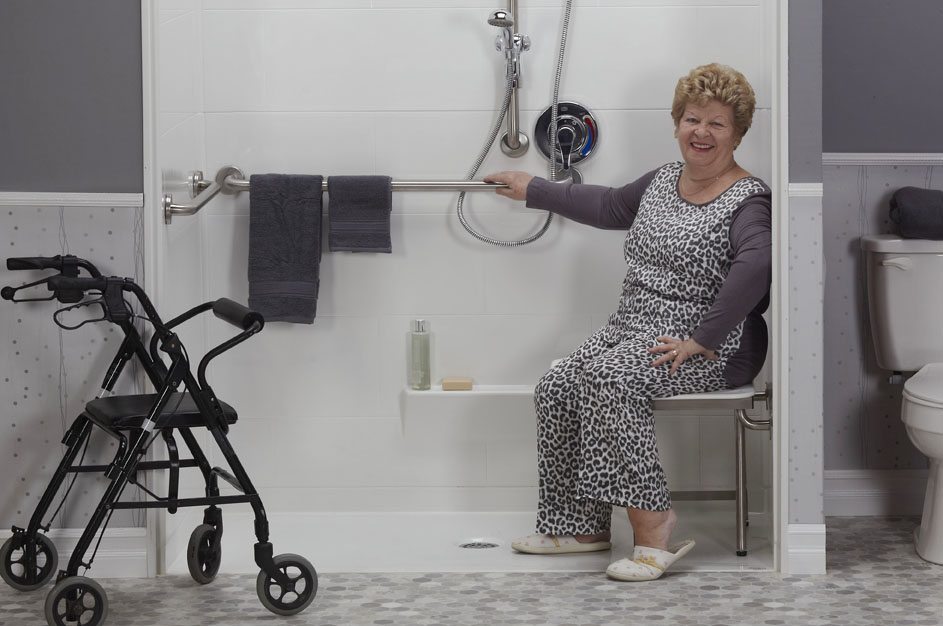We know that remodeling for accessibility can be overwhelming. Most homeowners are learning as they go about accessible bathrooms. There are some good questions that Accessibility Professionals get asked regularly, so we wanted to answer a couple of them here.
Question:
If I install a barrier free shower‚ what keeps the water in the accessible shower pan?
Answer:
Having a roll in shower has great advantages, including added safety‚ but there can be inherent issues with water retention. However‚ there are two products that can help keep the water in the shower pan.
The first solution would be to install a COLLAPSIBLE WATER RETAINER or a water dam. This is a flexible rubber strip‚ with a double sided epoxy tape that gets installed along the top of the threshold of the shower. This adds an extra 1” of height at the threshold to help keep the water in, but it’s flexible and soft‚ so you can still roll over it with a wheelchair. It squishes down as you roll over or step on it then pops back up once the user is inside. This water retainer would run along the entire length of the threshold, and for showers with a curved corner can run up the wall a bit for added water protection.
Another product that helps with water retention‚ would be a HEAVY DUTY WEIGHTED SHOWER CURTAIN. It needs to be long enough, and hung so that it almost touches the shower pan floor and can sit behind the water retainer. The weights in the bottom seam of the curtain prevents it from being blown outside of the pan, keeping water from running down and out onto your bathroom floor.
Together these two shower accessories work great to keep water inside your barrier free shower.
Question:
Can I install a shower door in my roll in accessible shower?
Answer:
Roll in showers are intended to be as accessible as possible. Adding a shower door will limit the accessibility of the unit‚ making it harder for wheelchair users to get in and out. We recommend using a shower curtain instead, for full accessibility.
However‚ if you do not need a roll in shower now‚ but may want to convert it to a barrier free shower later‚ there is a product that will make that possible.
A SEMI PERMANENT THRESHOLD ADAPTOR is a 2.75” high add-on threshold‚ with a flat top surface that you can install a shower door onto. You would install this over top of the barrier free threshold. This is a part that could be un-installed later on‚ if you need to convert your shower back to a roll in shower‚ by removing the door and this threshold.
This is a great way to plan for aging in place‚ even if you are currently fully mobile.
Another option, for those who are caring for and assisting someone in a barrier free shower, is to install our CAREGIVER DOORS. These are half height doors that provide some privacy for bathers receiving caregiver assistance, while keeping the caregiver relatively dry.
Stay tuned for more answers to frequently asked questions. Do you have any questions about accessible bathrooms? We’d love to hear from you.
If you enjoyed this post, please consider sharing it on Facebook or Twitter below.
P.S. We’d love to meet you on Twitter here or on Facebook here

Does the foot of the tub/shower (faucet) have to be on the same wall as the lavatory or can it be at the opposite end?
Thank you Rex for your question. For residential installation, usually the faucet is on the same wall as the lavatory and sink, as the plumbing is usually behind one wall in the bathroom (the plumbing or wet wall). However, it may be difficult for someone, due to accessibility reasons to reach the shower/tub faucet. You’ll want to check with a plumber or contractor if it’s possible to move the plumbing to the other wall if that is your preference.
If this is a commercial project, you’ll need to confirm the code requirements for plumbing changes like that.
We’re looking to install a barrier free shower for my grandmother. I appreciate the advice to also install caregiver doors so that the caregiver can stay nice and dry. I wouldn’t have thought about this, but this is great advice!